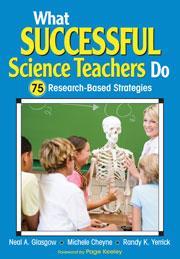Declan Fleming reviews this strategy toolkit
What successful science teachers do - 75 research-based strategies
Neal Glasgow and Michele Cheyne
London, UK: Sage Publications 2010 | Pp272 | £22.99 (PB) | ISBN 978 141 297 234 5
Reviewed by Declan Fleming

As a science teacher I dislike prescriptive education fads, especially when they come propped up by research that doesn't hold up to a lot of scrutiny. So when Education in Chemistry approached me to do a book review and I heard the title of the book was What successful science teachers do: 75 research-based strategies, my gut reaction was that I wasn't going to like it. I have to say I was pleasantly surprised.
From a teacher's perspective, the first good thing about this book when you pick it up is that it's accessible. The strategies are broken down into eight areas and each is only a few pages long, which means it's a book you can dip into when you have a moment to give you an idea you'd like to explore. You're given the strategy in a (often obtuse) sentence, followed by a summary of research in the area, classroom applications, pitfalls and selected references for further reading.
The book isn't preachy and I like the style that is suggestive of a toolkit to dip into rather than a one-size-fits-all approach. The authors also engender a degree of trust as they are not afraid to highlight potential weaknesses in the research they cite.
Having been stimulated by the introduction and research sections for these strategies, I was left deflated by many of the 'applications' sections, wanting to see specific examples or case studies rather than waffle. However I do think this is a fair trade-off for a book that's designed more to get you thinking than to give you all the answers.
The book provides links to places where you can find a body of evidence to support you, should management come asking questions. There is also a mixture of sources that is not limited to the peer-reviewed literature which means your average teacher at least stands a chance of getting hold of it.
Experienced science teachers might not find much new here but it's helpful to get a reminder from time to time. It's not a cheap buy and there are a number of books I'd recommend to science teachers above it, but it is a book that you will probably come back to over time and will probably prove a worthy investment.






No comments yet